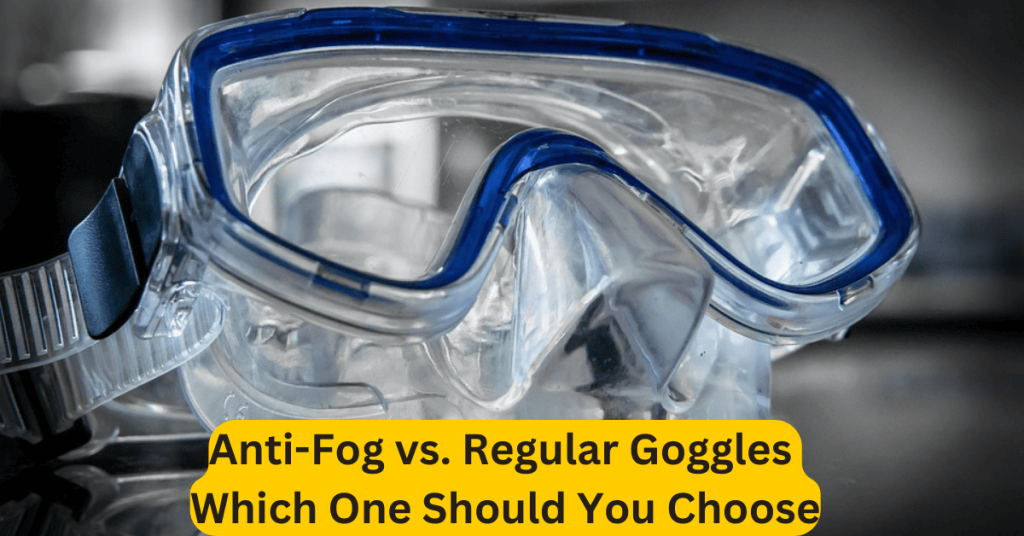Anti-Fog vs. Regular Goggles – Which One Should You Choose?
Whether you’re a seasoned swimmer or a beginner, the choice of goggles plays a pivotal role in your swimming experience. A good pair of goggles ensures clear vision, comfort, and protection from the chemicals in pool water. But one of the most debated features in the world of swimming goggles is whether to opt for anti-fog goggles or stick with regular lenses. The decision can be tricky, especially if you’re unsure about the benefits of anti-fog technology or if you think the additional cost isn’t necessary.
We will break down the key differences between anti-fog and regular swimming goggles, explore the pros and cons of each, and help you decide which type best suits your needs. By the end, you’ll have a clear understanding of which goggles will enhance your swimming experience.
Looking for the perfect fit? Check Out These Best-Selling Anti-Fog vs. Regular Goggles.

1. Understanding Swimming Goggles: The Basics
Before delving into the difference between anti-fog and regular goggles, let’s first understand what goggles are and why they are essential for swimmers.
1.1 Why Do Swimmers Need Goggles?
Goggles serve a number of key purposes for swimmers:
- Eye Protection: Pool water contains chlorine and other chemicals that can irritate the eyes. Goggles create a barrier that prevents chemicals from coming into direct contact with the eyes.
- Clear Vision: Goggles provide swimmers with a clearer view of their surroundings. Underwater, the refracted light can make it hard to see, and goggles help to improve visibility and focus.
- Comfort: Without goggles, the eyes can become dry and irritated, leading to discomfort. Goggles keep the eyes moist and comfortable throughout the swim.
1.2 What Are Anti-Fog Goggles?
Anti-fog goggles are designed with a special coating or treatment that helps prevent fog from building up on the lens. This treatment keeps the goggles clear, ensuring optimal visibility while swimming. Anti-fog coatings can last for varying amounts of time, depending on the brand and type of goggles, and some models may offer a more long-lasting effect than others.
Regular swimming goggles, on the other hand, do not come with this anti-fog treatment. As a result, they tend to fog up more easily during use, which can be frustrating for swimmers who need consistent and clear vision underwater.
2. The Pros and Cons of Anti-Fog Goggles
2.1 Pros of Anti-Fog Goggles
- Clear Vision for Longer: The primary advantage of anti-fog goggles is that they offer prolonged clear vision. The special coating on the lenses prevents moisture from collecting on the inside, meaning you won’t have to stop during your swim to wipe away fog. This is particularly beneficial for competitive swimmers or anyone who swims for extended periods.
- Improved Performance: For competitive swimmers or those who train frequently, the ability to see clearly without fogging is crucial. Anti-fog goggles allow you to focus on your technique without worrying about your vision becoming obstructed.
- Convenience: Anti-fog goggles save you the hassle of having to wipe the lenses with a towel or fingers during your swim, which is often the case with regular goggles. This feature makes them a more convenient option for swimmers looking for an uninterrupted swimming experience.
- Better Safety: For those swimming in open water or outdoor pools, maintaining a clear view is not just about performance, but safety as well. Anti-fog lenses provide better visibility, which is essential when navigating unfamiliar environments or dealing with changing lighting conditions.
2.2 Cons of Anti-Fog Goggles
- Potential for Deterioration: One downside of anti-fog goggles is that the coating can wear off over time. Frequent exposure to chlorine, saltwater, or even just regular use can degrade the anti-fog coating, reducing its effectiveness. While some goggles come with a durable anti-fog treatment, others may require reapplication or replacement sooner than expected.
- Higher Price: Anti-fog goggles tend to be more expensive than regular goggles due to the added technology and features. If you’re on a tight budget, the price difference may be a significant factor in your decision-making process.
- Maintenance: To prolong the life of your anti-fog goggles, you need to care for them properly. Avoid touching the inside of the lenses, rinse them with fresh water after each use, and store them properly to prevent the coating from degrading. If you’re someone who prefers low-maintenance gear, this could be a downside.
Read More: The Ultimate Guide to Waterproof Swimming Goggles: Features to Look For
3. The Pros and Cons of Regular Goggles
3.1 Pros of Regular Goggles
- Affordability: One of the biggest advantages of regular goggles is their affordability. Without the added anti-fog coating, they typically cost less, making them a good option for casual swimmers or those just starting out.
- Durability: Regular goggles are often more durable than their anti-fog counterparts because they don’t have a fragile coating that can wear off. If you swim infrequently or only for short periods, regular goggles might be the more practical choice.
- Simplicity: Regular goggles are often simpler in design, which means they’re easier to clean and maintain. If you don’t mind wiping away fog during your swim, regular goggles offer no-nonsense functionality.
3.2 Cons of Regular Goggles
- Fogging Issues: The primary downside of regular goggles is that they tend to fog up quickly, especially during longer swims. The fogging can disrupt your vision, leading to an unpleasant experience. For competitive swimmers or anyone swimming for extended periods, this can be a significant inconvenience.
- Interrupted Swim Sessions: To clear the fog from regular goggles, you’ll need to stop swimming, take them off, and wipe the inside of the lenses. This interruption can be frustrating, particularly if you’re in the middle of a training session or competitive race.
- Less Comfort: Since regular goggles don’t come with the same level of convenience as anti-fog goggles, you may have to deal with more fog and moisture, which could lead to discomfort around your eyes over time.
4. Which Goggles Should You Choose? Anti-Fog vs. Regular Goggles
The decision between anti-fog and regular goggles largely depends on your swimming needs, habits, and budget. Here’s a breakdown to help you make the best decision:
4.1 Choose Anti-Fog Goggles If:
- You Swim Frequently: If you swim regularly—whether for fitness, training, or competition—anti-fog goggles are the more suitable option. The longer you swim, the more likely it is that regular goggles will fog up. Anti-fog goggles will ensure consistent, clear vision throughout your swim.
- You’re a Competitive Swimmer: Competitive swimmers require precision and focus. Anti-fog goggles are essential for maintaining clear vision throughout long training sessions or races. With anti-fog goggles, you can keep your eyes on the finish line without distractions from fogged lenses.
- You Swim Outdoors or in Open Water: If you swim in open water, where visibility and safety are crucial, anti-fog goggles will improve your ability to spot other swimmers, obstacles, and your direction. This is particularly important when training for events like triathlons.
- You Want Convenience: If you don’t want to interrupt your swim session to clear fog from your goggles, anti-fog lenses are the way to go. They allow you to focus on your swim without having to pause and adjust your goggles.
4.2 Choose Regular Goggles If:
- You’re On a Budget: If you’re just starting to swim or swim occasionally, regular goggles are a great cost-effective option. They provide all the basic functionality without the extra expense.
- You Swim Infrequently or for Short Periods: If you’re a recreational swimmer who doesn’t spend extended periods in the pool, the fogging issue may not be as big of a concern. You can simply take a break and wipe the fog away if it forms.
- You Prefer Low-Maintenance Gear: If you’re not interested in worrying about the longevity of the anti-fog coating or the extra care required to maintain anti-fog goggles, regular goggles may be more up your alley. They’re simple to clean and care for.
- You Swim in Controlled Conditions: If you primarily swim indoors in well-lit, temperature-controlled pools, you may not experience as much fogging with regular goggles. The lack of humidity or temperature fluctuations can reduce the likelihood of fogging.
5. 7 Frequently Asked Questions About Anti-Fog and Regular Goggles
1. How do anti-fog goggles work?
Anti-fog goggles are treated with a special coating that prevents the accumulation of moisture on the lens. This coating reduces the condensation that forms when warm, humid air comes into contact with the cooler surface of the goggles.
2. How long does the anti-fog coating last?
The lifespan of the anti-fog coating depends on the brand and quality of the goggles. Some coatings can last for several months, while others may begin to degrade after a few weeks of frequent use. Proper care can extend the effectiveness of the anti-fog coating.
3. Can I reapply the anti-fog coating?
Yes, you can purchase anti-fog sprays or solutions that allow you to reapply the coating to your goggles if it wears off. However, the effectiveness of these solutions can vary, and it may not restore the goggles to their original performance.
4. Can I fix foggy regular goggles?
If your regular goggles are fogging up, you can wipe the lenses with a clean cloth or use an anti-fog spray to temporarily restore clarity. However, this will need to be done periodically throughout your swim.
5. Are anti-fog goggles suitable for open-water swimming?
Yes, anti-fog goggles are ideal for open-water swimming. They provide clear visibility without the need for constant adjustments, which is particularly important when swimming outdoors where conditions can change rapidly.
6. What should I do if my anti-fog goggles start fogging?
If your anti-fog goggles start to fog, rinse them with fresh water and store them in a cool, dry place. Avoid wiping the inside of the lenses, as this can damage the coating. If fogging persists, consider using a reapplication solution.
7. Can I use regular goggles for competitive swimming?
While regular goggles can be used for competitive swimming, they are less optimal due to their tendency to fog up during longer swims or races. Anti-fog goggles are generally preferred by competitive swimmers for clearer vision and uninterrupted performance.
Conclusion
When it comes to choosing between anti-fog and regular swimming goggles, the decision largely depends on how often you swim, your budget, and the importance of clear vision during your swim. Anti-fog goggles are ideal for frequent swimmers, competitive athletes, or those who swim in outdoor environments.
Regular goggles offer a budget-friendly option for casual swimmers or those who don’t mind wiping away fog during their session. Ultimately, the right choice for you will enhance your swimming experience, whether you prioritize comfort, performance, or value.
Suggest Tools





